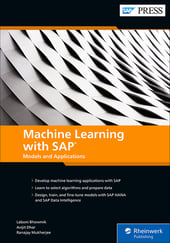Like many people, it takes me driving to the same place a few times to become familiar with the route.
This is why I heavily rely on directions. Eventually, if I’ve done the drive enough, I’m not as clingy to my GPS. I remember my exit number, and that the mall on the right indicates my next turn is coming up. I get used to the patterns. And like many people, understanding patterns is how I learn and become better at anticipating things.
Machine learning is the same concept, and when applied to the automotive industry, automakers have the ability to facilitate a more efficient manufacturing process and enhance the user experience. In this blog post, we’ll review SAP’s machine learning capabilities and how they can benefit the automotive industry.
Machine Learning in SAP
Machine learning is one of SAP’s core intelligent technologies. It focuses on applications that learn from experience, rather than through programming, and improves decision making and accuracy of predictions. The algorithms have the ability to find patterns and make predictions based on the provided data, and are constantly learning in order to perform better.
Machine learning can process unlimited amounts of comprehensive data that can then be used to review and improve business strategies. The speed at which it can analyze and process data makes it possible for companies to take actions at the appropriate time. Also, the ability to analyze and interpret past behaviors or outcomes provides an opportunity to compare that with new data to make more accurate predictions.
Another superpower machine learning wields is automating decision-making tasks. We see this often from a customer standpoint on social media with chatbots that monitor customer sentiment. Negative posts can be flagged and the chatbot is able to reply instantly as the first line of customer support.
Businesses across all industries can utilize SAP’s machine learning functionality to enhance their operations and processes in various ways. SAP offers a robust machine learning portfolio that combines intelligent apps and extensions, a data science platform, embedded machine learning, and other services. The automotive industry, specifically, can benefit from SAP’s machine learning capabilities. To learn more about SAP’s offerings for AI and machine learning, click here.
Machine Learning for the Automotive Industry
Automakers are constantly looking to make sure maintenance and manufacturing processes are as efficient as possible, as well as improve driver safety and experience.
Improving Maintenance & Manufacturing Processes
Automotive companies can deploy machine learning to help increase a vehicle’s performance by monitoring, controlling, or anticipating machine failure and other common issues. Leveraging SAP Data Intelligence’s data management solutions for machine learning and predictive maintenance helps to foresee vehicle issues and prevent them before they happen.
With predictive maintenance, the system uses collected data to analyze the equipment, compare specs with industry and safety standards, and forecast machine failure. Not only does this prevent safety risks, but the use of predictive maintenance lowers costs and increases efficiency. Machine learning with SAP HANA (formerly known as SAP Leonardo Machine Learning Foundation) and SAP Data Hub play an important role in the SAP Data Intelligence platform, offering data orchestration and machine learning functionality on SAP Business Technology Platform.
Many automotive companies looking to improve productivity and efficiency can also utilize SAP Intelligent Robotic Process Automation (RPA) to reduce the number of manual repetitive tasks such as service ticket classifications, routing and responses, and line-matching for cash application. SAP Intelligent RPA is used to automate repetitive and tactical business processes within SAP applications by utilizing specialized bots. This minimizes keying errors, speeds up work, and reduces costs. It handles unmodeled processes such as data entry, accounting, human resources, supply chain management, and other activities by specifying an automated process based on interactions with user interfaces. Machine learning manages expectations to guide the bot to execute the processes.
Improving Customer Experience
Then, of course, there’s user-facing automation capabilities. Machine learning can service many areas in the automotive realm, but a common first thought for many when they consider artificial intelligence in cars is self-driving capabilities. Manufacturers are working to improve this technology, which can help to reduce the number of car crashes that take place. It will also be beneficial for those with disabilities, such as the blind, as it offers more freedom and self-sufficiency. Though there are companies like Tesla and Google that are close to developing fully autonomous cars, this capability is still a couple of decades away.
Vehicles utilizing machine learning technology also provide capabilities for driver assistance and safety. Like self-driving capabilities, features such as blind-spot and cross-traffic detectors and emergency braking reduce the risk of car crashes. Fortunately, we already see vehicles that offer these features.
Another user-facing capability of machine learning is personalized marketing. Product recommendation is a key component of any sales and marketing strategy. For car dealership websites, machine learning models can be used to analyze customer search and browsing data to learn their interests. Personalized recommendations and ads will be presented to the consumer, and in turn, can increase the probability of a sale.
We see personalized marketing in action through driving apps, as well – the Waze app being a great example. As you’re driving, you’ll receive top-sheet notifications that make pit-stop suggestions, such as coffee shops or gas stations, that are on the way to your destination. With the help of machine learning, like in many GPS systems, the app also remembers your destination history, and will suggest destinations along with the best routes to take and times you should leave.
Similarly, personalized experiences within infotainment systems can be leveraged by connecting AI-cloud platform capabilities to big data and vehicle systems, which allows for making suggestions to drivers based on previous actions. An example from Mercedes-Benz is their MBUX infotainment system that uses artificial intelligence to predict and adapt to personal habits in the context of repetitive driving routes, radio stations often played, etc.
Conclusion
AI and machine learning capabilities have unlocked the doors of various opportunities for product enhancements in the automotive industry. Like many people, I find comfort in navigational help and protection from my car. Machine learning, specifically, is the forefront for automotive innovations that improve the manufacturers’ processes as well as the drivers’ experience.




Comments